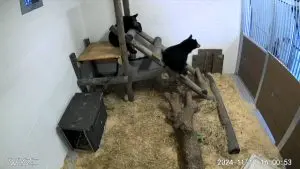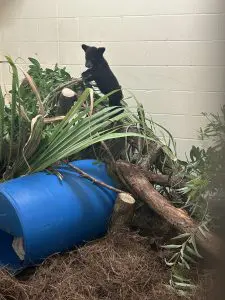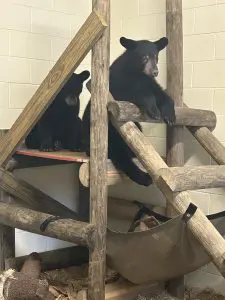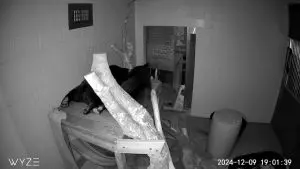

Pickles and Millie love to climb and perch in their temporary habitat together.
Our 2025 is already off to a paw-some start as we recently released two rehabilitated Florida black bear cubs, Pickles and Millie!
With staff from the Florida Fish and Wildlife Conservation Commission (FWC), these cubs were released Jan. 6 back to their natural range in a northern Florida forest.
This release has been long awaited, especially for Pickles, who first came into our care in May of last year. When FWC staff found Pickles alone on a busy highway, they immediately brought him to our Zoo. The cub needed some food and care, but he was otherwise healthy. So, we transferred him to FWC’s facility for orphaned or abandoned Florida black bear cubs in Homosassa Springs Wildlife State Park in July.

Pickles came to us when he was only 6 pounds!
Though Pickles was healthy at the time of his move, park staff noticed a gradual decline in the cub’s behavior. Pickles then returned to our care, so that our veterinary staff could perform a full checkup and see how they could help.
Our team treated the cub for a suspected kidney infection, and additional CT scans showed that Pickles had bony lesions, enlarged lymph nodes and impacted joints.
Since his diagnosis, we gave Pickles extra special care, including introducing antibiotics and pain meds and getting him back on track with a normal bear diet.
Despite the cards he’s been dealt, this cub quickly became a fan favorite because of his resilience and spunky personality. As his health improved, Pickles gradually perked up and began to act like his usual, high-spirited self!
“Pickles is a star,” said bear and wellbeing coordinator Marc Franzen.
In addition to receiving exceptional veterinary care, Marc and his team were strategic about introducing habitat features like perches and platforms into Pickles’ space as he recovered. By monitoring his mobility through camera footage, they were able to provide him with the right environment to learn crucial foraging techniques and behaviors without overexerting himself.
And luckily, Pickles enjoyed some company while he recovered!
“As we saw him progress, we added more and more to his space, including the opportunity to live with Millie,” he said. “Now, he’s destroying things exactly like a bear cub should!”
Millie is another Florida black bear cub who we suspect may have been separated from her mother after Hurricane Milton’s impact. The cub came to us ridden with scabs and ticks, which our vet staff quickly treated with anti-parasitic medication.
When Millie first came to us, she was shy and skittish.
“She was a flying bear,” said Director of Animal Programs Lauren Hinson. “One look at her, and she would jump across the room.”
But since settling into her temporary home and meeting Pickles, Millie’s demeanor completely shifted!
“She became much more confident and playful,” Lauren added. “She followed Pickles everywhere, sat on him and groomed him.”

Pickles and Millie hang out on their habitat’s platform together.
Pickles and Millie loved splashing in their bathtubs, chasing each other around, and playing with their enrichment items! They both enjoyed big piles of hay, and Pickles’ favorite snacks were peanuts and Gatorade ice treats.
When Pickles returned from his final checkup at our L3Harris Animal Care Center, Millie couldn’t have been happier to be reunited.
“She was glued to him,” Lauren remarked. “They fell asleep on the platform next to each other, flopped out with their feet side by side.”

Pickles and Millie have been two peas in a pod!
We are incredibly grateful for the opportunity to work alongside FWC’s Bear Management Program to rehabilitate and release rescued Florida black bear cubs across the state. Together, we give cubs like these a fresh start to live their best lives. So long, Pickles and Millie!
Contact FWC’s Wildlife Alert Hotline at 888-404-FWCC (3922) if you have found a sick, orphaned, injured or dead Florida black bear. You can also leave feedback for FWC commissioners regarding FWC’s Bear Management Plan here.
Special thanks to Flammio Financial Group, Stifel-Garvin Wealth Management Group, Artemis IT, and Jim and Darleen Barfield. Their generosity makes our work possible!
Brevard Zoo is an independent, not-for-profit organization that receives no recurring government funding for our operating costs. Your generous support enables us to continue to serve our community and continue our vital animal wellness, education and conservation programs.
